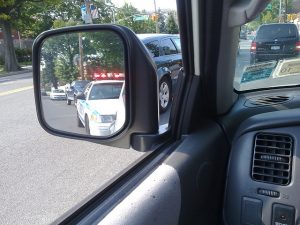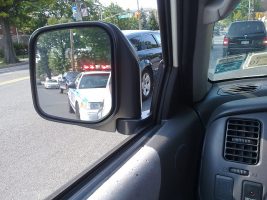
For most of us, blue flashing lights in the rearview mirror create a feeling of abject dread in the pit of the stomach. No one knows for sure how many tickets are written in the US each day but it’s thought to be well over 100,000. The average cost is $150, plus increased insurance premiums over the next three to five years. Speeding tickets are such moneymakers for the insurance industry that some big name insurance companies donate radar and laser guns to police departments. But the next time you get stopped, remember this: Highway patrol units usually give out nearly as many warnings as actual tickets, so you have a good chance of getting off. And if you use the following tips, you can slant the odds in your favor.
Preparation. Keep your registration and insurance papers organized and easy to access. A frantic search through your glove box will annoy the officer and cause you unnecessary stress. Always carry your driver’s license.
How to stop. Now is not the time to showcase your rebellious side. But remember your safety classes. Keep your hands on the steering wheel where the officer can see them to assure him that you are not reaching for a weapon. Look for a place that is safe, populated and well lit. And give the officer some advance warning.
“It’s probably a good idea to turn on your inside light, make some sort of motion that you’re going to pull over ahead, maybe turn on your flashers,” recommended a friendly detective. “Just something to let the officer know that you realize that he’s behind you, you’re not trying to run, that you’re going to stop up ahead.”
When you do stop, stay alert, don’t compromise your safety, especially if you only saw a blue light flashing and didn’t see the vehicle because it was dark outside. Be polite. Ask for identification, especially if you are traveling alone. “Don’t roll your windows way down, don’t unlock your doors,” “Wait till you see identification, a badge, a picture ID.” To verify the officer’s identity call 911. “Ask them who’s stopping you,” our friend said. “They should be able to tell you if it’s a local officer.”
 Squirrel Tip: If you have reason to be suspicious and fear that it’s someone masquerading as a police office, put your hazards on and drive to a spot where there is other passing traffic and lights. Maybe a gas station or restaurant parking lot. Explain to the office your reasons for not pulling over immediately.
Squirrel Tip: If you have reason to be suspicious and fear that it’s someone masquerading as a police office, put your hazards on and drive to a spot where there is other passing traffic and lights. Maybe a gas station or restaurant parking lot. Explain to the office your reasons for not pulling over immediately.
What to say. Usually the police will ask what you think you were doing wrong to get pulled over. SAY NOTHING! Be polite, but don’t incriminate yourself. Say something sensible like “I’m not sure what I was doing to cause you to pull me over. Please explain.” Cops agree that contrition is the number one way to get out of a ticket so look sorry — without saying something he’ll write down and use in court against you.
Be honest. Police officers have heard the stock excuses and are unlikely to believe that you were headed to the hospital or the airport. If you have a believable excuse, even if it’s just that you were trying to get home before your ice cream melts, you’re much more likely to get off. Don’t give the officer a rambling story; keep your answers short, truthful and polite. Be confident and friendly and make eye contact. Say “sir” or “ma’am.”
What not to say. Police officers hate unaware drivers; they cause accidents. So don’t act ditzy. “I didn’t know I was going that fast,” or “I didn’t see the sign,” are not good excuses.
Don’t insult the cop. Statements like, “What about that guy who passed me,” or “You just stopped me to fill you quota,” are likely to put you on the fast track to traffic court.
Wiley Ways
Hand the officer your license and then ask for directions. This establishes camaraderie and takes the officer’s mind off giving you a ticket. Hopefully, he will run your license and return it, make sure you know where you’re going and then send you on your way.
If you get a ticket, it’s a good idea to plead Not Guilty and go to court. In many US cities as many as half of the contested traffic tickets are dismissed because the officer can’t make it to the court date.
This is sneaky and we can’t recommend it (for all the liability reasons our lawyers insist upon) but we understand that if you pay your ticket and make the check out for more than the actual violation amount, the state will issue you a refund check for the difference. Then, if you don’t cash the check, the court case/docket cannot be closed properly, so it’s technically possible that no information will be reported to your insurance company or the DMV.
To be aware of, and to avoid speed traps in your area, check out www.speedtrap.org or a mobile app like Waze before hitting the road.

